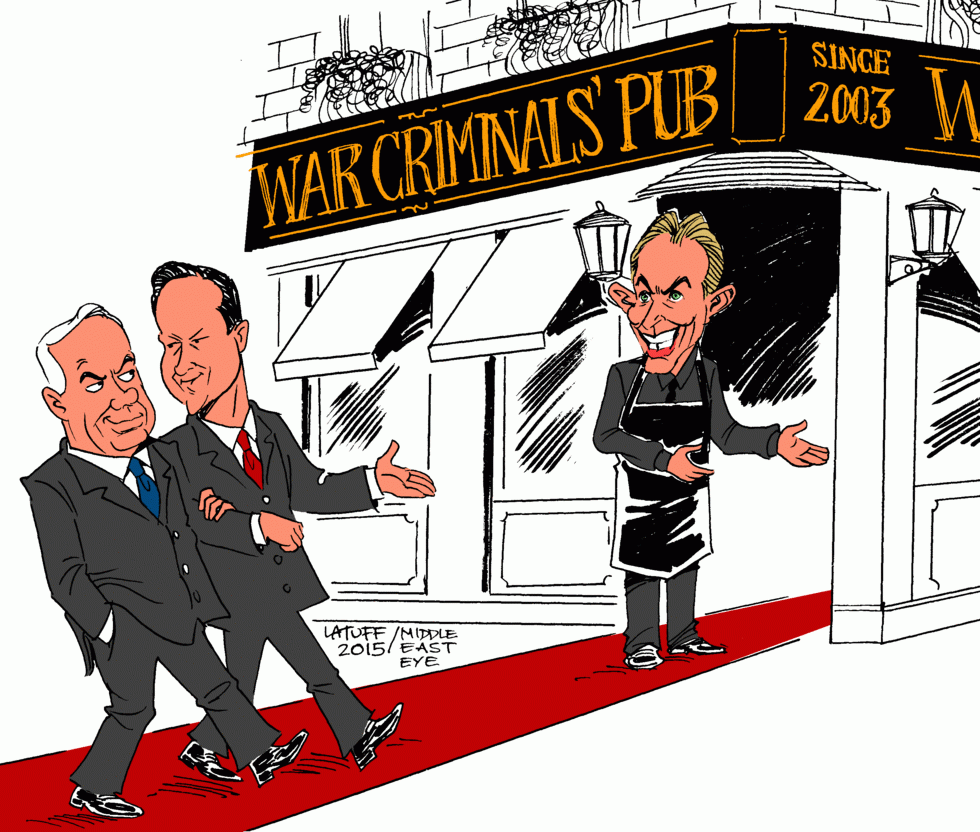Netanyahu to face protests, diplomatic pressure in London visit

Prime Minister Benjamin Netanyahu visits Britain this week for talks with his counterpart David Cameron as the right-wing Israeli leader faces diplomatic pressure over West Bank settlements and stalled peace efforts.
Netanyahu, who last visited for the 2013 funeral of former prime minister Margaret Thatcher, has also been the subject of a petition ahead of his trip demanding his arrest for war crimes over last year's devastating Gaza conflict.
As of Tuesday, the petition posted to the British parliament's website had been signed by more than 106,000 people. The British government has officially responded, saying that visiting heads of government are immune from prosecution.
Last summer's 51-day war took a heavy toll on the coastal enclave, killing 2,251 Palestinians and destroying thousands of homes. Seventy-three people were killed on the Israeli side, 67 of them soldiers.
The visit will see the two prime ministers meet on Thursday, the day after Netanyahu's arrival. He departs on Friday.
The Israeli leader's office declined to provide details of what will be on the agenda, although the visit comes with a number of tense issues facing his government.
Britain is one of a number of European countries pushing for the separate labelling of products from illegal Israeli settlements in the occupied West Bank and Israel remains deeply concerned by July's nuclear deal between Iran and major powers.
Britain, which was one of the six powers that negotiated the accord with Iran that Israel strongly opposed, reopened its embassy in Tehran last month.
Intelligence sharing is also likely to be on the agenda amid concerns over the Islamic State group and militants travelling to and from the region, analysts say.
Asked about the meeting between the two leaders, an Israeli official would say only that regional and bilateral issues would be addressed and that the talks would seek "to enhance what is already a very good relationship".
Protests planned
A group including members of parliament on Tuesday called for Israeli Prime Minister Benjamin Netanyahu’s visit to Britain to be cancelled.
In an open letter to The Guardian newspaper, 21 parliamentarians, academics and trade union leaders said Netanyahu “must bear responsibility for the war crimes identified by the UN human rights council” following last year’s Israeli offensive in Gaza.
British Prime Minister David Cameron should “not be welcoming the man who presides over Israel’s occupation and its siege of Gaza,” the letter added.
The Israeli leader is expected to face protests when he arrives in London on Wednesday. Calls for a demonstration outside Downing Street - Cameron’s official London residence - have been shared by thousands on social media.
The UK-based Palestine Solidarity Campaign said in a statement on Monday that protesters would wear Netanyahu and Cameron masks and hold family photos of some of the Palestinians killed in Israel’s 2014 Gaza assault.
“We want to know why David Cameron is welcoming a man directly responsible for UN-identified war crimes to the UK,” the statement said.
“His welcome for Netanyahu sends out a very negative message about the UK government’s attitude towards Israel’s serial human rights abuses and the war crimes it committed in Gaza last year,” it added.
“Mr Cameron should get his priorities straight. Instead of welcoming Netanyahu, he should be imposing immediate sanctions and an arms embargo on Israel until it complies with international law and ends the occupation and the siege on Gaza.”
Labelling of settlement goods
British Foreign Secretary Philip Hammond visited Israel in July in a bid to reassure Israeli leaders over the nuclear deal, but he and Netanyahu ended up sparring publicly over the agreement.
The Israeli premier argues that the restrictions placed on Iran's nuclear programme will not block its path to an atomic weapon and that the lifting of international sanctions will provide it with more funds to support militant groups around the region.
Beyond Iran, Cameron may seek to press Netanyahu on his government's persistent expansion of Jewish settlements in the Palestinian West Bank, regarded as illegal under international law.
Settlement construction was a leading factor in the collapse in the last round of US-brokered peace talks between Israel and Palestine in April 2014 and the issue remains a major obstacle to any re-launch.
In April, 16 EU member states, including Britain, urged the bloc to clearly label products which originated in Jewish settlements in the Palestinian territories, including Israeli-occupied East Jerusalem.
Netanyahu caused further frustration among Western governments during his successful campaign for re-election in March when he ruled out the establishment of a Palestinian state.
He later backtracked on the comments but they were widely seen as raising question marks about his commitment to the two-state solution, which is the basis of the current peace process.
Yossi Mekelberg of Regent's University in London and the Chatham House think tank's Middle East programme said Netanyahu was likely to be concerned by a possible "gradual erosion of Israel's position in the world" which he would want to counter.
"I think he thinks Cameron is one of the friendlier faces as far as Israel is concerned," Mekelberg said.
Labelling of settlement goods in the European Union as well as a separate boycott movement targeting Israel would have "incremental" effects, he said.
"But the accumulated impact eventually is big."
Middle East Eye propose une couverture et une analyse indépendantes et incomparables du Moyen-Orient, de l’Afrique du Nord et d’autres régions du monde. Pour en savoir plus sur la reprise de ce contenu et les frais qui s’appliquent, veuillez remplir ce formulaire [en anglais]. Pour en savoir plus sur MEE, cliquez ici [en anglais].

